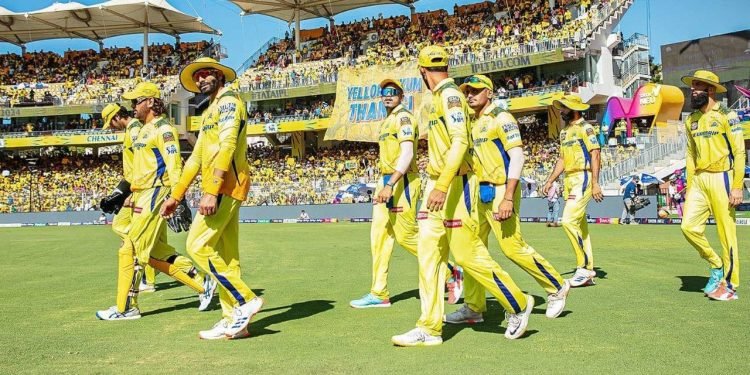CSK’s Resilience Amidst Adversity
On Sunday, May 12, Chennai Super Kings found themselves in a difficult situation due to various factors, including the high humidity of 73%. Typically, their qualification scenarios at this stage of the season are easy to handle, but this time it was different, with drama and mystery surrounding their final home game of the league phase. Despite starting the week with a sense of security, they had to adapt to the tough situation.
T20 is a format for crunched chaos, and CSK had to play two matches with only a 40-hour gap in between. They had just returned from Ahmedabad, where they had a tough time, to Chennai, where Rajasthan Royals had been practicing for two days, making it even more challenging. Unfortunately, Ruturaj Gaikwad lost the toss again, making it the 11th out of 13 games. The players were waiting for their fate with the coin, but they were told they had to bowl and field first in the heat.
At this point, intentions can start to melt away, and the way ahead can look hazy and improbable. The pitch had already seen three 200+ scores in four completed innings this season, making things even more difficult for CSK. However, in this first and only afternoon game of the season, the pitch played slow, offering a little comfort to CSK, which they hung on to amid everything stacked against them.
The Royals’ opening pair of Jos Buttler and Yashasvi Jaiswal had not performed well this season, which helped CSK. The reinstated Maheesh Theekshana, Shardul Thakur, and Tushar Deshpande gave nothing to the batters, and even though CSK couldn’t add to their measly tally of 15 PowerPlay wickets, they kept their opposition to just 42 runs in six overs.
Simarjeet Singh entered the fray and made a bright comeback in Dharamsala but gave away 60 in a collectively poor day in Gujarat. However, he surprised the Royals by sussing out the need of the hour and bowling hard lengths, which proved to be the way to go. His sprightly pace, coupled with the slowness of the pitch, made him an awkward proposition for batters. Jaiswal was rushed on an attempted pull and skied a catch, and Buttler chose an odd way out of the run-rate mire by attempting a scoop while a fine-leg fielder stood stationed.
With the only left-hander in the top order gone, Gaikwad could get Ravindra Jadeja to rattle through his four overs for just 24 runs. Theekshana himself gave away only 28 before Simarjeet rounded off his afternoon with a third big wicket, that of Sanju Samson for outstanding figures of 3 for 26 in Royals’ under-powered total of 141, which CSK overtook with a degree of ease.
In spite of CSK’s historical dominance in bowling, they have faced challenges in recent seasons at Chepauk due to the pitches not meeting their expectations. Nonetheless, the consistency of CSK’s batting has played a critical role in securing them playoff berths and their record fifth title. However, in 2024, CSK faced additional hurdles including injuries, form issues, and a less supportive home pitch, which tested their adaptability and resilience.
“I loved the game today,” said batting coach Michael Hussey after the win. “It was a close contest where both teams were under a lot of pressure. The wicket wasn’t the flattest, making it challenging for the batsmen to hit boundaries. Both teams showed their skills, and it was enjoyable to watch. While we like to see high scores, such as 260 or 270, sometimes it’s not fair for the bowlers. I enjoyed the pitch today, as it made for a lower-scoring and exciting game.”
The Evolution of Chennai’s Cricketing Dynamics: Pitch, Performance, and Strategy
Chepauk has remained consistent with the league’s evolutionary curve in the last two years by experiencing significant gains in batting. The average first-innings score at this venue has increased from 144 in 2019 to 170 in 2023 and further up to 177 this year. The rise in scores can be attributed to the Impact Player feature, which has been well-documented. Additionally, the pitches at Chennai have played a role in this increase. Although spin is a traditional strength of CSK, it has only produced 17 wickets at the venue this year at an average of 36.58 runs per wicket. Only the 2012 season saw spin wickets at a higher average.
While spin has not been the most successful in the wickets column, this pitch, according to Hussey, is closest to the kind that CSK has desired to fortify their home advantage. “Obviously, the BCCI wants to see good cricket and high scores. They want to see attacking and attractive cricket,” Hussey said. “We’ve had a lot of success in the past, based on our game around spin and batting against spin as well, which sometimes means the scores are going to be a little bit lower, so it’s about finding that balance. We’ve had a range of pitches, some very good batting pitches. Obviously, tonight’s pitch was a little bit slower.”
“I guess coming into the next auction, that’s something the management will have to think closely about. Our plan in the past has been to pick a squad around playing well in Chennai. We’ve had challenges along the way with that. I think probably tonight’s pitch was more… sort of conditions we enjoy playing in. We have played well in those conditions in the past, but you still have to work hard out there, and the guys certainly did tonight.”
PC: CSK








